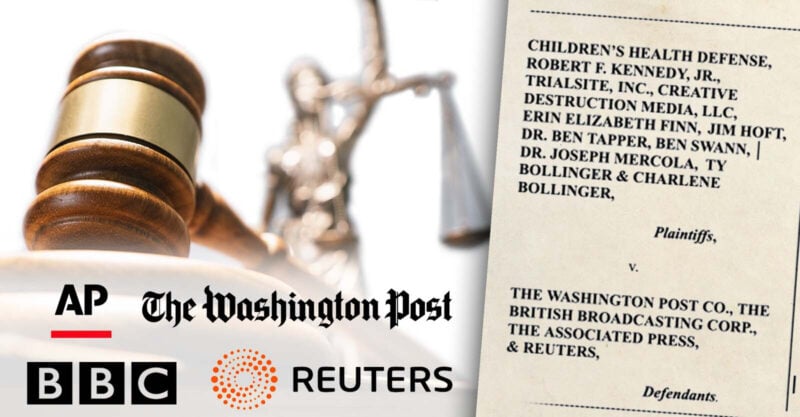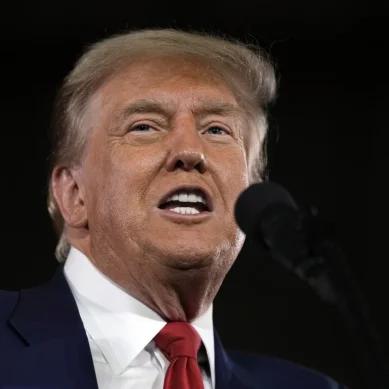
Stories of censorship and silencing appear increasingly more common among independent journalists and news sites as well as for the individuals who support them.
Plaintiffs from the Children’s Health Defense (CHD) antitrust lawsuit against the Trusted News Initiative appeared on Good Morning CHD television talk-show on Wednesday evening to share their experiences with social media tyranny and how it has impacted their organisations.
This was happening against the backdrop of litigation against legacy media and major drug manufacturers that skimmed data that would have saved lives during Covid-19 pandemic between 2019 and 2022.
According to the lawsuit, “This is an antitrust action,” and specifically, “Federal antitrust law has its own name for this kind of ‘industry partnership’. TI’s called a “group boycott” and is a per se violation of the Sherman Act.”
Legal precedent holds that a “group boycott” is “a concerted attempt by a group of competitors” to “disadvantage [other] competitors” by “cut[ting] off access” to a “facility or market necessary to enable the boycotted firm[s] to compete.”
As evidence of this allegation, the lawsuit references multiple public statements by Trusted News Initiative (TNI) partners, including a March 2022 statement by Jamie Angus, then-senior news controller for BBC News, who explained TNI’s “strategy to beat disinformation”.
Angus said, “Of course, the members of the Trusted News Initiative are … rivals … But in a crisis situation like this, absolutely, organisations have to focus on the things they have in common, rather than…their commercial … rivalries. … [I]t’s important that trusted news providers club together.
“Because actually the real rivalry now is not between for example the BBC and CNN globally, it’s actually between all trusted news providers and a tidal wave of unchecked [reporting] that’s being piped out mainly through digital platforms.…That’s the real competition now in the digital media world.
“Of course, organisations will always compete against one another for audiences. But the existential threat I think is that overall breakdown in trust, so that trusted news organizations lose in the long term if audiences just abandon the idea of a relationship of trust with news organizations. So actually, we’ve got a lot more to hold us together than we have to work in competition with one another.”
The lawsuit alleges the above quote admitting the “existential threat” members of the TNI believed smaller news organisations posed to their news and informational primacy is evidence of anti-competitive collusion and of TNI members’ economic motivation to stifle this “threat”: “a paradigmatic antitrust violation … to cut off from the market upstart rivals threatening their business model.”
Angus has since left the BBC to take up a position with Saudi Arabia’s state-owned television broadcaster, according to the lawsuit.
“Plaintiffs are among the many victims of the TNI’s agreement and its group boycott,” states the lawsuit. “Plaintiffs are online news publishers who, as a result of the TNI’s group boycott, have been censored, de-monetised, demoted, throttled, shadow-banned and/or excluded entirely from platforms like Facebook, YouTube, Twitter and Instagram.”
As a result of this group boycott, the lawsuit states, “The TNI did not only prevent Internet users from making these claims; it shut down online news publishers who simply reported that such claims were being made by potentially credible sources, such as scientists and physicians.
“Thus, TNI members not only suppressed competition in the online news market but deprived the public of important information on matters of the highest public concern.”
The plaintiffs referenced Supreme Court precedent – specifically, a 1945 ruling involving the AP – to support their First Amendment claims against TNI, noting that contrary to popular belief, First Amendment violations do not exclusively refer to the censorship of speech by the government.
The lawsuit states that in the 1945 case, Associated Press v. United States, a news industry partnership (the AP) “prevented non-members from publishing certain stories.”
These non-members sued under the Sherman Act, but the AP claimed its actions were protected by the First Amendment. However, the Supreme Court sided with the plaintiffs. In the majority opinion, Justice Felix Frankfurter wrote that the First Amendment:
“… rests on the assumption that the widest possible dissemination of information from diverse and antagonistic sources is essential to the welfare of the public, that a free press is a condition of a free society.
“Surely a command that the government itself shall not impede the free flow of ideas does not afford nongovernmental combinations a refuge if they impose restraints upon that constitutionally guaranteed freedom.
“Freedom to publish means freedom for all, and not for some. Freedom to publish is guaranteed by the Constitution, but freedom to combine to keep others from publishing is not. Freedom of the press from governmental interference under the First Amendment does not sanction repression of that freedom by private interests.”
Holland commented on the significance of the Supreme Court precedent, telling The Defender: “The lawsuit is resting on a really strong Supreme Court precedent that basically says whether it is government censorship or it is collusive anti-competitive illegal suppression by the private sector, it’s illegal. You can’t do that.
“The AP, in its day, was very much a kind of precursor of the TNI, and it’s a very strong decision, very strong language against the Associated Press that was essentially doing the same thing back in the day.”
Noting the enormous market share held by Big Tech firms such as Facebook, Google, Microsoft and Twitter, the lawsuit states, “The TNI’s Big Tech members are ‘platform gatekeepers’ in the online news market, with the power to cripple or destroy publishers by excluding them from their platforms.”
TNI’s legacy news partners took advantage of their cooperation with each other and with Big Tech, to “choke off” inconvenient narratives, the plaintiffs argue.
The lawsuit notes, for instance, that “TNI members agreed in early 2020 that their ‘ground-breaking collaboration’ would target online news relating to Covid-19 and that TNI members would ‘work together to … ensure [that] harmful disinformation myths are stopped in their tracks’” and “jointly [combat] fraud and misinformation about the virus.”
In July 2020, the lawsuit states, “TNI ‘extended’ its collaboration to cover so-called ‘disinformation’ about the United States presidential election,” stating it was “committed to a shared early warning system of rapid alerts to combat the spread of disinformation during the US presidential election.”
And in 2020 and 2021, according to the lawsuit, the BBC’s Jessica Cecil, then-head of the TNI, made a series of statements, including a claim that TNI was “the only place in the world where disinformation is discussed in real-time” and that its partners sought to find “practical ways to choke off” stories and topics TNI deemed “misinformation.”
- The Defender report / By senior reporter for The Defender Michael Nevradakis, based in Athens, Greece











